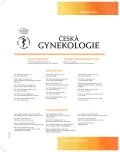Sacrococcygeal teratoma
Authors:
G. Mlčochová 1; L. Kučerová 2; B. Rousková 2; M. Rygl 2; B. Prosová 3; J. Matěcha 4
; Michal Černý 1
; L. Hercíková 5; J. Sochůrek 6; Tomáš Fait 4
Authors‘ workplace:
Novorozenecké oddělení s JIRP, Gynekologicko-porodnická klinika 2. LF UK a FN Motol, Praha, prim. MUDr. M. Černý
1; Klinika dětské chirurgie 2. LF UK a FN Motol, Praha, přednosta prof. MUDr. M. Rygl, Ph. D.
2; Klinika zobrazovacích metod 2. LF UK a FN Motol, Praha, přednosta prof. MUDr. M. Roček, CSc.
3; Gynekologicko-porodnická klinika 2. LF UK a FN Motol, Praha, přednosta MUDr. R. Chmel, Ph. D., MHA
4; Gynekologická ambulance, Poliklinika Škoda, Mladá Boleslav, vedoucí MUDr. L. Hercíková
5; Gynekologie Amáta, Mladá Boleslav, vedoucí MUDr. J. Sochůrek
6
Published in:
Ceska Gynekol 2019; 84(2): 140-144
Category:
Case Report
Overview
Objective: Description of newborn with early prenatal diagnosis of sacrococcygeal teratomia.
Desing: Case report.
Setting: Department of Obstetrics and Gynecology, 2nd Faculty of Medicine and Faculty Hospital Motol Prague.
Case report: In this case report a term neonate with a massive sacrococcygeal teratoma was delivered by a cesarean section (approach by Geppert) with an intrapartal relieving punction of the tumor. It was a type II SCT with both pelvic end extracorporal component with a size of 60×35 centimeters. The tumor was completely resected during the first day of life and was followed by a normal function of lower extremities, normal bowel function and only transitional urinary tract symptoms.
Conclusion: A sacrococcygeal teratoma (SCT) is the most common congenital tumor in newborns with reported incidence of 1 : 35000-40000 live births affecting more frequently females (4 : 1). This germinal tumor is either benign (mature) or malignant (immature), mature types are more common in neonates. A SCT is usually diagnosed by prenatal ultrasound, magnetic resonance is performed to characterize it‘s size and content, type of tumor (type I–IV Altman classification) and relation to surrounding tissues. Preemptive early delivery by cesarean section is recommended when the tumor exceeds the diameter of 5 centimeters to avoid complications during vaginal delivery (rupture, bleeding etc.). The primary treatment of SCT is an early surgical resection with a complete resection of the coccyx („en bloc“ resection), malignant tumors are indicated for adjuvant chemotherapy. Long term complications can be urinary tract or bowel dysfunctions, lower extremity muscle weakness or paralysis and recurrence of the tumor with potential malignancy.
Keywords:
sacrococcygeal teratoma – SCT – delivery technique – intrapartal punction
Sources
1. Ahmad, M., Arora, M., Ullah, E., et al. Neonatal sacrococcygeal teratoma with acute renal failure. Case Reports, 2013, doi: 10.1136/bcr-2013-009304.
2. Aktepe Keskin, E., Arikan Onaran, Y., Derbent, A., et al. Prenatal diagnosis and follow-up of giant sacrococcygeal teratoma. Taiwan J Obstet Gynecol, 2011, 50(2), p. 242–244.
3. Coleman, A., Shaaban, A., Keswani, S., et al. Sacrococcygeal teratoma growth rate predicts adverse outcomes. J Ped Surg, 2014, 49(6), p. 985–989.
4. Firszt, OP., Myga-Porosilo, J., Pośpieszny, K., et al. Radiological features of sacrococcygeal teratomas in fetal magnetic resonance imaging and computed tomography – a case report. Polish J Radiol, 2018, 83, p. 19–23.
5. Gross, SJ., Benzie, RJ., Sermer, M., et al. Sacrococcygeal teratoma: Prenatal diagnosis and management. AJOG, 1987, 156 (2), p. 393–396.
6. Hambraeus, M., Hagander, L., Stenström, P., et al. Long-Term Outcome of Sacrococcygeal Teratoma: A Controlled Cohort Study of Urinary Tract and Bowel Dysfunction and Predictors of Poor Outcome. J Pediatr, 2018, 198, p. 131–136.
7. Hussam, SH., Akram, ME. Sacrococcygeal teratoma: management and outcomes. Ann Ped Surg, 2014, 10, p. 72-77.
8. Krška, Z., Hoskovec, D., Petruželka, L. Chirurgická onkologie. Praha: Grada, 2014.
9. Tuladhar, R., Patole, SK., Whitehall, JS. Sacrococcygeal teratoma in the perinatal period. Postgrad Med J, 2000, 76, p. 754–759.
10. Yoon, HM., Byeon, S., Hwang, JY., et al. Sacrococcygeal teratomas in newborns: a comprehensive review for the radiologists. Acta Radiol, 2017, 59(2), p. 236–246.
11. Gebb, JS., Khalek, N., Qamar, H., et al. High tumor volume to fetal weight ratio is associated with worse fetal outcomes and increased maternal risk in fetuses with sacrococcygeal teratoma. Fetal Diagn Ther, 2018. doi: 10.1159/000486782.
Labels
Paediatric gynaecology Gynaecology and obstetrics Reproduction medicineArticle was published in
Czech Gynaecology

2019 Issue 2
-
All articles in this issue
- Operative vaginal deliveries and their impact on maternal and neonatal outcomes – prospective analysis
- Střednědobé výsledky chirurgické léčby recidivující cystokély po hysterektomii s využitím transvaginálního implantátu
- Sakrospinous fixation sec. Miyazaki – complications and long-term results
- Pilot study comparing tolerance of transperineal and endoanal ultrasound examination of anal sphincter
- Is it possible to estimate urethral mobility based on maximal urethral closure pressure measurements?
- Uterine rupture during pregnancy and delivery: risk factors, symptoms and maternal and neonatal outcomes – restrospective cohort
- Maternal morbidity and mortality in Slovak Republic in the years 2007–2015
- Sacrococcygeal teratoma
- Embolic event in the puerperium with tragic end
- Gynecological and urological aspects of pelvic vasculitis
- Latest findings on the placenta from the point of view of immunology, tolerance and mesenchymal stem cells
- Bisphenols in the pathology of reproduction
- Correlation between integration of high-risk HPV genome into human DNA detected by molecular combing and the severity of cervical lesions: first results of the EXPL-HPV-002 study
- Czech Gynaecology
- Journal archive
- Current issue
- About the journal
Most read in this issue
- Uterine rupture during pregnancy and delivery: risk factors, symptoms and maternal and neonatal outcomes – restrospective cohort
- Sacrococcygeal teratoma
- Operative vaginal deliveries and their impact on maternal and neonatal outcomes – prospective analysis
- Latest findings on the placenta from the point of view of immunology, tolerance and mesenchymal stem cells
